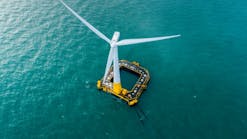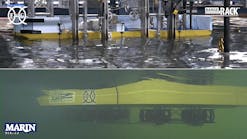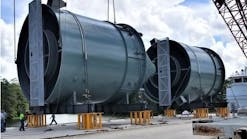Brøvig/RDS merger has marginal field production contracting in its sights
Brøvig Offshore's Crystal Sea production ship is now producing Tuskar Resources' Obe Field off Nigeria.
The recent merger of Brøvig Offshore of Norway and RDS Resource of the UK aims to create a new force in the area of marginal field production contracting. The two companies have already worked together for some time and have jointly developed and are now producing the Obe Field in the Nigerian offshore sector.
"One of the main reasons why we met with RDS Resource in the first place was that we were both looking at some specific marginal fields and wanted to compare notes," says Brøvig Offshore's Managing Director Jan Fosse. "We seemed to have an identical view of the opportunities in marginal field development and tail-end production."
Brøvig Offshore's background is in shipping. Three years ago the Oslo-based company sold off its offshore supply ship fleet to concentrate on providing test and production services with its specialized vessel, Crystal Sea. Having recently taken delivery of a second vessel, Crystal Ocean, its focus is now on providing production ship services.
RDS is a firm of consulting professionals set up in 1993. The company, most of whose employees are from oil companies, is a successful product of the trend to outsourcing that has gripped the oil industry in recent years. "In effect, we are the technical guts of an oil company," says Commercial Director John Harris. "We provide expertise in geology, geophysics, petrophysics, reservoir engineering, petroleum engineering, drilling and completions engineering, and even seismic processing. We can turn technical data into a field development plan."
In the last three years, RDS has been involved in drilling 26 wells in places as diverse as Indonesia, West Africa, Myanmar, Pakistan, Thailand, Algeria, Tunisia, Cuba, and the North Sea. Notably, it provides subsurface expertise for DNO's Heather field, where it has played an important role in helping to extend the field's production life. Last year, the company won the overall performance prize in the Scottish Offshore Achievement Awards.
Breakthrough on Obe
The first contract for newbuild Crystal Ocean is well-testing on the Marcel prospect in the UK sector for Talisman.
A taste of what is on offer from the Brøvig/RDS combination can be had from their work on Obe, which is operated by Houston-based Tuskar Resources. "Obe was the breakthrough contract for us," says Fosse. "From the time we signed the contract to achieving first oil took only five and one-half months."
The company's scope of work included re-entering the discovery well and implementing a dual completion, a difficult and sophisticated completion which took a little longer than the ambitious schedule had allowed for, according to Fosse. A Noble Drilling jackup was hired to carry out the drilling and completion work. "This was the first full cooperation between RDS and Brøvig where we were able to demonstrate our joint capabilities," says Fosse.
The well is now producing to the Crystal Sea at an initial rate of some 7,000 b/d - enough to raise thoughts of further development. If this happens, Brøvig Production Services would be keen to be involved, but Fosse points out that its contract currently covers only the existing well.
This kind of work involves a readiness to assume a fair degree of risk on the contractor's part - in the case of the Obe contract, the minimum period was a mere 90 days, and the maximum was five years. Payment is based on a combination of a fixed rate and production incentives.
Brøvig Production Services has now secured its first contract for Crystal Ocean, which is to carry out a well test on Talisman's Marcel Field in the UK sector. The test was due to start in early April and will last for 14-30 days. Crystal Sea started life as a well testing vessel, capable of processing and storing the crude oil produced during testing, which is normally burned off. It offers the double benefit of reducing unwanted emissions to the environment and providing a source of revenue to set against the cost of the test. The vessel had a 15-month contract with Statoil which used its services as required, and worked for many other North Sea operators. However, it was often idle and Brøvig decided in late 1998 that well testing should not be its primary market.
The Crystal Sea venture was entered into with Halliburton, which owns 48% of the vessel and provides the process crew and maintenance. In the case of the Crystal Ocean, which was built at the Kv
Experience incorporated
Crystal Sea and Crystal Ocean have similar dimensions, but the newbuild vessel reflects the experience acquired by Brøvig in the five years since Crystal Sea was built, and has somewhat greater and more flexible capacity, with some 37,000 b/d liquids handling capacity and 1.5 MMcm/d of gas, and could handle a larger number of wells. Both ships are able to store 50,000 bbl of oil.
The friendly merger involves Brøvig paying £7 million in a combination of cash, shares, and an earn-out arrangement. RDS will continue with its present name and management. RDS Managing Director Peter Leach has taken over as managing director of Brøvig Production Services, the Aberdeen-based company which will operate the production contracting services. His place at RDS has been taken by Keith Collins. RDS' commercial director John Harris has taken on the same role for Brøvig Production Services, whose management team is completed by business development director Bernie Morrison.
Brøvig Offshore has now received its shareholders' approval for a NKr 136 million shares issue. "We see a lot of opportunities in the marketplace," says Fosse. "If we are going to take advantage of them, we need to strengthen our capital base and plan for growth." If the strategy is right, the company should be looking forward to growth, both in staff numbers and, Fosse hopes, in the size of its fleet.




